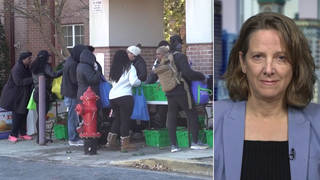
Topics
Guests
- Sergio Ciancaglinico-author of Sin Patrón: Stories from Argentina’s Worker-Run Factories.
Avi Lewis and Naomi Klein documented the struggles of Argentine workers occupying their factories in the 2004 film The Take. We play an excerpt of the film and speak to Argentine journalist Sergio Ciancaglini, co-author of Sin Patrón: Stories from Argentina’s Worker-Run Factories. [includes rush transcript]
Transcript
AMY GOODMAN:
We turn to an excerpt of Avi Lewis and Naomi Klein’s documentary, The Take, about workers in Argentina taking over factories abandoned by their owners.
AVI LEWIS: Zanon Ceramics. After two years under worker control, it’s the granddaddy of this new movement. Today, the factory is in production with 300 workers. Decisions are made in assemblies: one worker, one vote. Everyone gets exactly the same salary.
NAOMI KLEIN: It wasn’t always like this. A couple of years ago, the owner claimed that the plant was no longer profitable, that it had to be shut down. The workers refused to accept that fate. They argued that the company owed so much to the community in debts and public subsidies that it now belonged to everyone. In the Menem years, the Zanon factory had received millions in corporate welfare, and the owners still ran up huge debts. Now that his workers have restarted the machines, he’s back.
Are you going to get your factory back?
LUIS ZANON: [translated] I’m going to get it back.
NAOMI KLEIN: How are you going to do it?
LUIS ZANON: [translated] The government will give it back to me. The government will give it back to me.
AVI LEWIS: That means the workers can never rest. They keep a 24-hour guard at the factory, and everyone is equipped with a slingshot, in case the police show up.
NAOMI KLEIN: Their struggle against authority has even won them fans in one of Argentina’s biggest rock bands. Bersuit is in town, and the band is dedicating its show to the workers of Zanon.
MEMBER OF BERSUIT: [translated] What the guys in Zanon did, fighting against the police with just marbles, like when we were kids, with slingshots against real weapons, they took over the factory.
AVI LEWIS: But as we discovered walking down Main Street, Zanon’s real weapon is the support of the community.
NAOMI KLEIN: What do you think of the Zanon plant under worker control?
MAN AT COUNTER: [translated] That it works better than under the former owners, because at least people are working. The tiles are cheaper, and the future is brighter than it was under the owners. All they did was get subsidies from the state, nothing else, and they kept the money for themselves.
WOMAN AT COUNTER: [translated] All I know is that the community supports them 100 percent, because they’re not stealing, they’re not killing anyone. On the contrary, they’re working to feed their families.
BARBER: [translated] There are many companies that should be in the hands of the workers. But it seems that this is not politically convenient. That’s the real problem.
CROWD: [translated] And now that we are in production, Mr. Zanon, you can kiss our asses!
NAOMI KLEIN: What do you think of this slogan of the workers, which is “_Zanon es del pueblo_,” “Zanon is of the people”?
LUIS ZANON: [translated] What can I say? It’s not true. It’s not of the people. The investment was mine, all the work was mine. I put in everything. It can’t be “of the people.”
AVI LEWIS: You’re standing in front of $90 million worth of factory, which you and your companeros have taken over for your own benefit. We have a word for that. It’s called stealing.
RAUL GODOY: [translated] There’s another word: “expropriation.” And that’s what we’re going for.
NAOMI KLEIN: The Zanon workers have gathered thousands of signatures supporting their demand for definitive expropriation. They donate tiles to local hospitals and schools.
AVI LEWIS: And Zanon’s community building has paid off. Since the workers’ takeover, they have fought off six separate eviction orders. Each time, thousands of supporters have flocked to the factory, set up defenses, and been ready to put their bodies between the machines and the police. Each time, the judges’ trustees have retreated, leaving the factory under worker control. For now, Zanon really is the property of the people.
JUAN GONZALEZ: An excerpt from the documentary The Take, directed by Avi Lewis and written by Naomi Klein, who are with us today for the hour.
We’re also joined now by Sergio Ciancaglini, co-author of Sin Patron: Stories from Argentina’s Worker-Run Factories.
Welcome to Democracy Now!
SERGIO CIANCAGLINI:
[translated] Thank you.
JUAN GONZALEZ: Could you tell us what has happened in the factory that you occupied back then, was occupied back then by the workers, that was in this documentary?
SERGIO CIANCAGLINI:
[translated] Today, the factories continue to operate, and better all the time. And also, there are new factories that are being recovered. And something else is also happening. Many organizations, many children of these factories, are being born with a horizontal work style, separate, completely autonomous of the government and political parties, creating a boss-less model and also new alternatives of cooperatives that are health cooperative projects, education, clothing, metalworking. Hundreds and hundreds of recovered factories and thousands and thousands of new projects, cooperative projects that are in solidarity, they’re also working with us. Lavaca is a cooperative. But, for example, they’re working with us on projects of psychiatric hospitals, and the doctors are discovering that the job, the work, helps to cure insanity.
AMY GOODMAN:
Sergio, you are a well-known journalist in Argentina. You and your partner quit the corporate media to cover cooperatives like that and be part of a cooperative yourself. How does the media cover this in Argentina?
SERGIO CIANCAGLINI:
[translated] The media are not means, not media. [in English] They aren’t medium of nothing. They are — [translated] journalists are not journalists, and information is not information. It’s what we call formatting of heads, of minds. So the possibility for factories and new projects is to create new options and to make their own voices heard.
NAOMI KLEIN: I would just — if I could just jump in, I first met Sergio in the middle of the craziness in Argentina after the collapse of five governments in 2001. Argentina, if you remember, the huge protests, the cacerolazos, they threw out the president, then they went through — they cycled through four more presidents in a period of three weeks. In this period, when Argentina was really on fire, the protests were outside the congress, outside the Plaza de Mayo, but they were also outside the media stations, outside Clarin, outside the radio stations, holding corporate media accountable for the way in which they were distorting the protests.
And at the same time as you had this popular rebellion across the country, there was also an independent media revolution going on in Argentina. Indymedia Argentina was crucial in this period. And it was really the first time where you saw Indymedia in an absolutely central role, in really a national uprising. You went to Indymedia to find out where the next protest was, to communicate.
And Lavaca came out of this period. And I always remember Sergio’s partner, Claudia Acuna, who’s, you know, a great friend of ours. And really, both Sergio and Claudia played a huge role in shaping the vision in The Take and also in my book, in The Shock Doctrine, Claudia saying to me — we interviewed her for the film, and this clip didn’t make it into the film, but I always remember that Claudia said she just couldn’t understand how people went to gyms and went on the treadmill, because how could they not be in the streets, walking and walking and talking to people when the country was — so much was happening in the country. She says, “I just don’t understand those people on treadmills.” And that’s Claudia and Sergio. They are on the streets, just covering the country. It’s incredible what they’re doing.
JUAN GONZALEZ:
I’d like to ask you, you said that the movement is largely independent or autonomous of political parties. But what has been the impact of the movement on the government? And how has the government responded to the continuing movement of factory takeovers or workplace takeovers?
SERGIO CIANCAGLINI:
[translated] The factory movement is related as an adult relationship with whoever. The difference is that the person that decides is the assembly. That’s who decides. In relationship to the state, at one point the workers called it a dumb state, a stupid state, that doesn’t understand and is not interested in understanding because of its alliance with the companies. The importance of these projects — I don’t know if you could call them “the revolution,” I don’t know if there’s one single revolution. But I learned that there can be many small revolutions that change people’s lives, that allow them to work, create new relationships among themselves, and [in English] democracy now. We are doing it.
AMY GOODMAN:
Last question, we just have thirty seconds. It was the middle class who took to the streets and smashed the windows of banks. Is that movement at all supportive of the takeover of factories?
SERGIO CIANCAGLINI:
I didn’t understand, and I want — it’s very important for me to understand it.
AMY GOODMAN:
Well, since we only have thirty seconds, I’m going to just quickly ask that question to Naomi.
NAOMI KLEIN:
Well, absolutely. You know, university students, lots of middle-class people supported the occupied factories.
SERGIO CIANCAGLINI:
Excuse me, but I understood something.
AMY GOODMAN:
OK.
SERGIO CIANCAGLINI:
One thing. The medium class —
AMY GOODMAN:
Yes.
SERGIO CIANCAGLINI:
—- is no -— [inaudible] learned about the factories. They began to make assemblies, and now, in all Argentina, you have assemblies fighting against the open minering.
NAOMI KLEIN:
Open mining. Open pit mining.
SERGIO CIANCAGLINI:
[translated] Today in Argentina there are many movements of the recovered factories.
AMY GOODMAN:
We have five seconds.
SERGIO CIANCAGLINI:
They took the concept, the idea, of how to organize themselves and how to fight in very different areas.
AMY GOODMAN:
We leave it there. Thank you very much for joining us, Sergio Ciancaglini and Naomi Klein.












Media Options